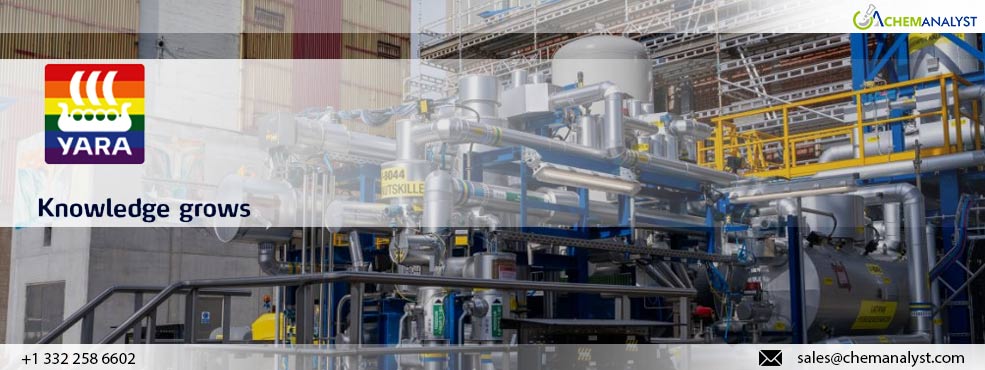Welcome To ChemAnalyst

On June 10, 2024, Yara International will officially inaugurate its renewable hydrogen plant at Herøya, Norway. Yara is now producing renewable hydrogen and ammonia, having already delivered the first tonnes of fertilizers made from the renewable ammonia produced at this facility. "This is a significant milestone for Yara and for the decarbonization of the food value chain, shipping fuel, and other energy-intensive industries," said Svein Tore Holsether, President & CEO of Yara.
On June 10, 2024, Norwegian Prime Minister Mr. Jonas Gahr Støre officiated the inauguration of the 24 MW renewable hydrogen plant at Herøya Industrial Park. This facility stands as the largest of its kind currently operating in Europe. The hydrogen is generated through electrolysis of water using renewable energy, effectively substituting natural gas as feedstock and resulting in an annual reduction of 41,000 tonnes of CO2 emissions from the site.
" This project is pioneering and demonstrates our dedication to responsibly feeding the world while protecting the environment. I would like to express my appreciation to our devoted employees who have worked tirelessly to realize this cutting-edge production, as well as to Enova for their support, our partners, and our visionary customers who are spearheading the path towards a more sustainable future. We are delighted to have delivered the initial batches of low-carbon footprint fertilizers to Lantmännen, showcasing how collaboration across the entire food value chain is essential for decarbonization. Together, we have taken a significant stride towards decarbonizing challenging sectors," Holsether stated.
The newly produced and delivered fertilizers with a low-carbon footprint will form part of a fresh portfolio named Yara Climate Choice. These offerings promise to enhance crop productivity while simultaneously aiding in the decarbonization of the food value chain and mitigating climate impact. Alongside fertilizers created through electrolysis of water and renewable energy, a significant portion of Yara's future portfolio will consist of fertilizers derived from low-carbon ammonia produced via carbon capture storage (CCS).
"Renewable ammonia plays a crucial role in the decarbonization process, yet achieving scalability requires significant time and effort. With 2030 quickly approaching, we are diligently working on producing low-carbon ammonia with CCS technology. This effort aims to support the hydrogen economy and foster the growth of emerging markets for low-emission ammonia," commented Hans Olav Raen, CEO of Yara Clean Ammonia.
In 2023, Yara signed a binding agreement with Northern Lights for CO2 transport and storage, marking the first operational cross-border CCS agreement in the world. Yara's objective is to diminish its yearly CO2 emissions by 800,000 tons from ammonia production at Yara Sluiskil. Additionally, Yara is assessing the feasibility of one to two large-scale projects for low-carbon ammonia production with CCS in the United States.
" Meeting the goals of the Paris Agreement requires immediate action on multiple fronts, with CCS emerging as a crucial tool for rapid and economically viable decarbonization. The transition to a greener future demands investments, stable regulatory frameworks, extensive expansion of renewable energy infrastructure and grids, ongoing technological advancements, and the simultaneous development of demand and supply in a maturing market. Companies prioritizing these efforts stand to gain a competitive edge. At Yara, we've already achieved a 45 percent reduction in emissions since 2005. With our strategy to deliver profitable, scalable decarbonized solutions swiftly—powered by both renewable energy and CCS—we are uniquely positioned to meet the needs of shareholders, customers, employees, and society as a whole," remarked Holsether.
We use cookies to deliver the best possible experience on our website. To learn more, visit our Privacy Policy. By continuing to use this site or by closing this box, you consent to our use of cookies. More info.
